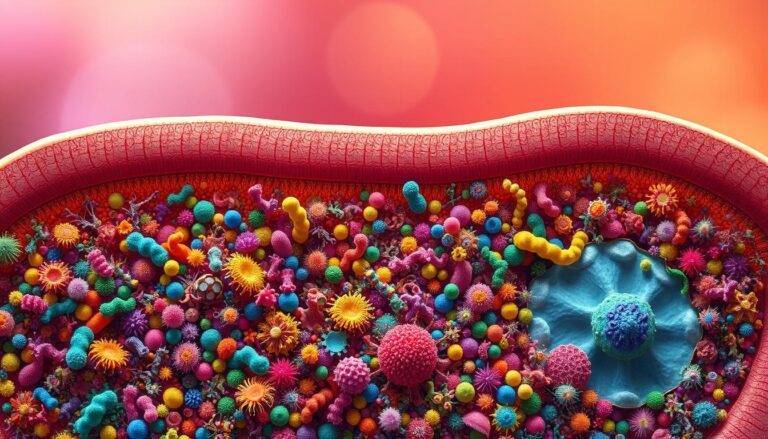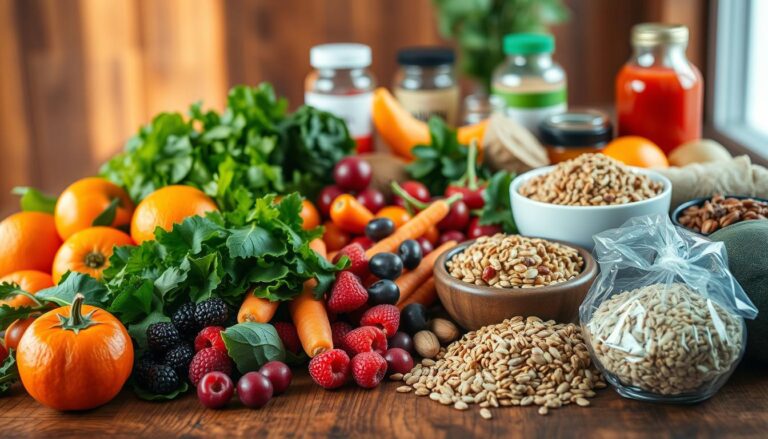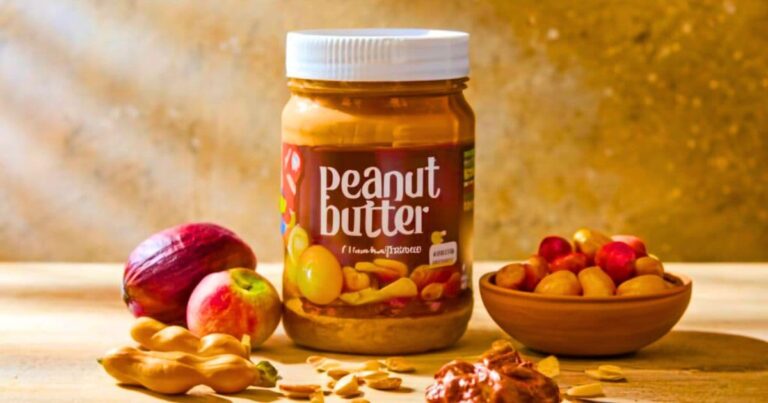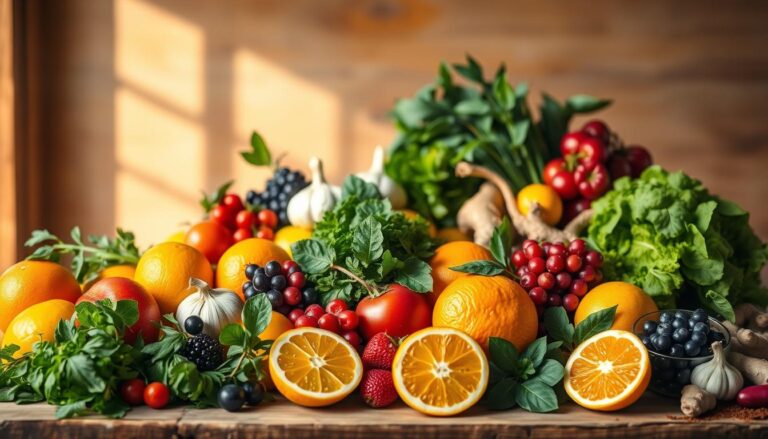Can the right bodybuilding diet turn average gains into record-breaking muscle mass? For bodybuilders, success is not just about lifting weights.
It’s also about the right muscle-building nutrition. Unlike powerlifting or Olympic lifting, bodybuilding aims for a lean, balanced physique.
A well-structured bodybuilding diet needs a 15% caloric surplus during bulking. For example, someone needing 3,000 calories daily should aim for 3,450. But how do these numbers match up with science?
Research points to a 55-60% carbohydrate, 25-30% protein, and 15-20% fat split for muscle growth.
A study in the Journal of the International Society of Sports Nutrition found that bodybuilders in early prep phases eat more calories. This shows the importance of phased approaches.
Even small changes, like gaining over 1% body weight weekly, can harm progress. This makes precision key.
Key Takeaways
- A 15% caloric surplus during bulking maximizes muscle growth without excess fat gain.
- Carbohydrates form the largest portion (55-60%) of an effective bodybuilding diet.
- Structured phases like bulking and cutting, backed by science, are essential for optimal results.
- Protein intake ranges from 259-302 grams daily during bulking to support muscle repair.
- Avoiding fad diets and focusing on evidence-based strategies ensures sustainable progress.
Understanding the Science Behind Muscle Growth and Nutrition
Muscle growth needs the right nutrition to work. The right mix of macronutrients is key. This mix must support muscle protein synthesis MPS.
Proteins break down into amino acids. These amino acids start the process of making new muscle fibers. Studies show that leucine, a special amino acid, boosts MPS when eaten with other amino acids.
How Nutrition Triggers Muscle Protein Synthesis
To boost MPS, bodybuilders need 1.6–2.2 grams of protein per kilogram of body weight each day. For someone weighing 82 kg, that’s 131–180 grams of protein daily. Foods high in quality protein, like chicken breast or cottage cheese, are best.
| Food | Serving Size | Protein g |
|---|---|---|
| Salmon | 3 oz 85g | 17 |
| Tuna | 3 oz 85g | 20 |
| Edamame | 1 cup 155g | 18 |
The Anabolic Window Fact or Fiction?
Post-exercise protein intake within 4–6 hours sustains MPS but rigid timing is unnecessary for most individuals.
Research shows eating protein within 30 minutes after working out helps. But it’s not the only time that matters. Eating protein regularly throughout the day is more important than timing.
Studies suggest eating 20–40g of protein every 3–4 hours keeps muscles growing. This keeps the body in a state ready to build muscle.
Caloric Surplus The Foundation of Muscle Building
To grow muscles, you need more calories than you burn. Aim for 350–500 extra calories a day. This should be 40% carbs, 30% protein, and 30% fats.
For example, a 180-lb male needs 2,500 calories a day to maintain weight. He should eat 2,850–3,000 calories to build muscle. Choose nutrient-rich foods like lean meats, whole grains, and healthy fats to avoid too much fat.
What is the Best Diet for Bodybuilding?
Good bodybuilding diets help muscles grow and keep you healthy. Everyone reacts differently to food, so a single diet doesn’t work for everyone. It’s important to mix science with what works for you.

Defining Optimal Nutrition for Muscle Gain
To grow muscles, you need more calories than you burn. Experts say eat 25-30% of your calories as protein. This means a 190-pound person should eat 103-147g of protein every day.
Include foods rich in nutrients like Greek yogurt and lean ground beef. These foods are packed with protein to help you build muscle.
Individual Factors That Influence Diet Effectiveness
Things like age, metabolism, and genetics play a big role in how you digest food. For example, a 150-pound male might need 2,500 calories a day. But this number can change.
Use apps to track your weight and calories. This helps you make sure you’re eating right for your goals. Bodybuilders often don’t get enough nutrients, so it’s key to watch your diet closely.
Comparing Popular Bodybuilding Diet Approaches
Fasting on alternate days correlates with fat oxidation improvements noted recent studies.
There are a few popular diets:
- High-carb diets: Focus on carbs before and after workouts
- Ketogenic diets: Eat more fat, less carbs, but not ideal for gaining mass
- Carb cycling: Switch between high and low carb days to control fat
Intermittent fasting can help with losing fat. But it’s important to time it right to keep your muscles.
Evidence Based Nutrition Principles for Bodybuilders
Here are some tips that work for everyone:
- Keep track of your meals to make sure you’re eating enough
- Eat protein every 3-4 hours to keep your energy up
- Drink water, not sugary drinks
Eating small meals 5-6 times a day helps keep your energy steady. Stay away from processed foods to avoid inflammation and cravings.
Protein Requirements The Building Blocks of Muscle
A diet rich in protein is key for muscle growth. Bodybuilders need 1.2–2.2 grams of protein per kilogram of body weight each day. This helps repair and grow muscles. The American College of Sports Medicine suggests more protein for those who do resistance training.
It’s important to spread out protein intake. Aim for 20–40 grams of high-quality protein every 3–4 hours. This helps muscles grow all day long. For example, a 180-pound person needs 100–180 grams of protein a day when bulking.
| Phase | Protein Intake g/kg/day | Total Daily Protein 82 kg athlete |
|---|---|---|
| Bulking | 1.6–2.2 | 131–180g |
| Cutting | 1.8–2.7 | 148–221g |
Choosing the right protein sources is vital. Focus on lean meats, eggs, Greek yogurt, and plant-based foods like lentils and quinoa. Don’t just rely on supplements. Whole foods add important nutrients for recovery. Not enough protein can lead to losing up to 15% of muscle during cutting phases.
- 30–35% of total calories should come from protein
- Pair protein with carbs in a 1:3 ratio post-workout
- Monitor intake to avoid exceeding 2.2g/kg without medical supervision
Protein timing and quality are as important as quantity for sustaining lean mass during dietary changes. Schoenfeld, 2010
Everyone’s needs are different. Athletes with kidney issues should talk to their doctors before increasing protein. Focus on being consistent and balanced, making sure the high-protein diet supports your health goals.
Carbohydrates Fueling Your Workouts and Recovery

A good bodybuilder meal plan focuses on carbs as the main fuel for intense workouts. Carbs are key for energy and recovery. They help muscles work hard during exercise and help them recover afterwards.
Strategic Carb Timing for Maximum Performance
- Pre-Workout: Eat 30–60g complex carbs like oatmeal or quinoa 2 hours before training.
- Intra Workout: For long workouts take 30–90g carbs/hour with gels or bananas to fight fatigue.
- Post-Workout: Mix 0.4g carbs/lb of body weight with 20–40g protein within 2 hours after exercise to boost glycogen.
Complex vs. Simple Carbs in a Bodybuilding Diet
| Type | Examples | Glycemic Index | Use Case |
|---|---|---|---|
| Complex | Oatmeal, sweet potatoes, brown rice | Low to medium | Base of meals for sustained energy |
| Simple | Bananas, honey, sports drinks | High | Pre- or intra-workout for quick energy spikes |
Carb Cycling Strategies for Clean Bulking
Try a 4-day high-carb phase (4.5–5.5g/lb) followed by 3 days of moderate intake (3–4g/lb) to boost insulin sensitivity. This method helps avoid fat gain while keeping training intensity high. High-carb days should match leg or back workouts for best glycogen use.
Healthy Fats and Their Role in Hormone Production
Muscle-building nutrition needs a mix of optimal macronutrients for bodybuilding, including healthy fats. These fats help make hormones like testosterone, which helps muscles grow. Unlike what some think, fats don’t stop progress but help cells heal and recover.
Different types of fats have unique roles. For bodybuilding, focus on foods like avocados (15g of fat per serving), olive oil, and fatty fish like salmon. Omega-3s in these foods help reduce inflammation and support cell function. Eating 65–85g of fats a day keeps hormones balanced without adding too many calories.
- Avocados: rich in monounsaturated fats and vitamin E
- Walnuts: high in omega-3s and antioxidants
- Fatty fish: salmon and mackerel supply DHA/EPA for cell membrane integrity
Research in the Journal of Sports Science links adequate fat intake to 14% higher testosterone levels in resistance-trained men.
Use fats wisely. Mix almonds 6g protein, 14g fat per ounce with meals after working out to improve nutrient use. Stay away from trans fats and choose whole foods. Aim for an omega-6 to omega-3 ratio of 4:1 to keep hormones in check. This method was used by Schwarzenegger in his bulking days, with nuts and olive oil being key.
For muscle-building, 20–30% of daily calories should be from fats. This boosts testosterone, helps absorb vitamins A/D/E/K, and supports cell repair without losing lean muscle.
Meal Frequency and Nutrient Timing for Optimal Gains

Nutrient timing for bodybuilding has evolved. It now focuses on total intake over strict meal times. Studies suggest 3-6 meals a day can work, based on how well you can handle it. A 2016 study by Dr. Brad Schoenfeld found,
Total daily protein and calorie intake remains more critical than meal timing for muscle growth.
Pre Workout Nutrition Fueling Performance
Eat a mix of carbs and protein 1-3 hours before working out. For a 180-pound bodybuilder, aim for 40-60g carbs and 20-30g protein. This helps keep energy up without upsetting your stomach. Choose easy-to-digest foods like oatmeal with whey protein.
Post-Workout Recovery Accelerating Adaptation
- Drink 0.5g protein per kg of bodyweight within 2 hours after working out.
- Add 1.0-1.5g carbs/kg to refill glycogen stores.
- Research shows glycogen replenishment peaks in 30-60 minutes. But, the 4-6 hour window for muscle growth gives you flexibility in your meal plan.
Night-Time Nutrition Overnight Repair
Sleep is like a 6-8 hour fast. A slow-digesting protein like casein 20-30g 30 minutes before bed helps keep amino acids available. A study in the Journal of the International Society of Sports Nutrition showed nighttime protein boosts muscle growth by 22%.
While timing nutrients can bring small benefits, sticking to your total intake is key. Tailor your meal times to fit your workout schedule. But always keep your bodybuilder meal plan in mind. Adjust your pre- and post-workout meals based on how hard you worked and how you feel.
Supplement Stack Essentials for Natural Bodybuilders
Supplements are key for those on a bodybuilding diet or high-protein diet for muscle gain. They should boost nutrition, not replace it. It’s important to choose supplements that are backed by science.
Creatine monohydrate remains one of the most researched and effective supplements for increasing muscle mass and strength.
Protein Supplements Whey Casein and Plant Based Options
- Whey protein isolate is rich in amino acids, great for after workouts because it’s absorbed quickly.
- Casein’s slow release helps repair muscles at night. Plant-based proteins like pea or soy are good for vegans.
- Research shows whey protein builds muscle more than soy or casein in strength training.
Performance Enhancers Creatine Beta Alanine and Caffeine
Creatine 3–5g daily increases phosphocreatine, leading to 5–15% strength boosts. Beta-alanine 3–5g/day helps delay muscle fatigue by reducing lactic acid. Caffeine (5–6mg/kg body weight) improves focus and workout power.
Recovery Supplements BCAAs Glutamine and ZMA
BCAAs 5–10g pre/post-workout reduce muscle damage during hard training. Glutamine 5–10g post-workout boosts immune function and hydration. ZMA zinc and magnesium aspartate helps with testosterone and sleep.
Hydration Strategies The Overlooked Component of Muscle Building
Hydration is key for muscle building but often ignored. Even a small loss of 1-2% body weight can weaken strength by up to 10%. This can hurt your workout and recovery. Drinking enough water helps with metabolism, moving nutrients, and removing waste.
Dehydration slows muscle protein synthesis and prolongs recovery directly hinderinging progress toward fitness goals notes the National Strength and Conditioning Association.

- Daily Intake: Drink 1.8-2.3 liters of water each day. Increase by 500ml for every hour of hard exercise.
- Electrolyte Optimization: Add potassium from bananas and spinach and sodium from broth and tablets to keep fluids balanced during intense workouts.
- Timing Protocol: Drink 500ml two hours before working out, 200ml every 15-20 minutes during, and 4:1 water-to-electrolyte mix after.
Water helps your body absorb nutrients better. This means proteins and carbs get to your muscles faster.
Check your hydration by looking at your urine light yellow is good. Stay away from sugary drinks and choose electrolyte-rich ones for long workouts. Drinking water regularly helps your body work better, making gains and avoiding cramps and tiredness.
Creating Your Custom Bodybuilder Meal Plan
Creating a bodybuilder meal plan needs careful planning and tailoring. First, figure out your maintenance calories using the Mifflin-St Jeor equation. Then, add 10-20% more for muscle growth. For example, a 180-pound person looking to bulk might aim for 2,800-3,000 calories a day.
They should eat 130-180g of protein 1.6-2.2g/kg of body weight. Fats should be 0.5-1.5g/kg, and carbs should fill the rest of the calories.
- Sample Structure: Eat every 3-4 hours. Each meal should have 20-40g protein from foods like chicken salmon or Greek yogurt.
- Meal Prep Tips: Cook grains in bulk, grill proteins, and prepare snacks. Use containers for easy transport.
- Adaptations: Ectomorphs might need more carbs 55-60% of calories. Endomorphs should focus on lean proteins and fiber.
Follow the International Society of Sports Nutrition ISSN for workout nutrition. For example, eat oatmeal with whey protein before working out. After, mix fast carbs like bananas with protein whey shake. A good weightlifting diet also includes lots of water 3-4L a day.
Use AI tools like MyFitnessPal or Noom to keep track and adjust your macros weekly. Stay away from processed sugars and refined carbs. Focus on whole foods like quinoa, broccoli, and almonds. Eating at regular times and controlling portions helps build muscle without too much fat.
Bulking and Cutting Cycles Adjusting Your Diet for Different Phases
Effective bodybuilding diet strategies rely on strategic phase transitions. During bulking phases a caloric surplus of 200-400 calories supports muscle growth without excessive fat gain.
The Journal of Strength and Conditioning Research highlights that even moderate surpluses achieve gains comparable to higher surpluses, with reduced fat storage risks.
- Bulking: Prioritize nutrient-dense foods, aiming for 0.25-0.5% weekly weight gain
- Cutting: Target a 0.5-1% weekly weight loss using a 250-500 calorie deficit
- Protein intake remains high (2.3-3.1g/kg fat-free mass) in both phases
Bulking and cutting cycles may increase eating disorder risks when misapplied warns research from Eating and Weight Disorders. Emphasize mindful transitions to maintain mental and physical health.
Cutting phases optimize fat loss through structured macronutrient plits: 55-60% carbs, 15-30% fats with protein as the priority.
Regular refeeds every 7-10 days help maintain metabolic health. The Mifflin-St Jeor equation calculates baseline needs: 10×weight in kg + 6.25×height in cm – (5×age) +5 for men. Women subtract 161 instead of adding 5.
Weightlifting diet success depends on consistent tracking using apps like MyFitnessPal. Competitive bodybuilders often spend 2-4 months in cutting phases, balancing deficit intensity with recovery priorities. Prioritize lean proteins, fiber-rich carbs, and healthy fats during both phases to sustain performance and recovery.
Common Bodybuilding Diet Mistakes and How to Avoid Them
Avoiding common pitfalls is key to growing muscles. Three big mistakes underestimating protein, neglecting vitamins, and following fad diets can slow you down. Here’s how to fix these issues.
Undereating Protein While Overestimating Intake
Many don’t realize how much protein they need. A protein-rich diet should have 1–1.5g of protein for every pound of body weight. Common mistakes include:
- Guessing portion sizes instead of measuring
- Not accounting for protein lost during cooking
- Missing out on protein in foods like Greek yogurt or lentils
Use apps to track your protein intake every day to meet your goals.
Neglecting Micronutrients in Pursuit of Macros
Too much focus on macros can lead to neglecting vitamins and minerals. Lack of zinc, vitamin D, or B12 can hurt muscle repair and hormone balance. Here’s how to fix it:
- Eat colorful veggies for fiber and antioxidants
- Add nuts and seeds for healthy fats and magnesium
- Think about taking multivitamin supplements if you’re missing out on nutrients
Falling for Fad Diets and Supplement Marketing
Following untested trends or unproven supplements can be a waste of time. Stick to:
- Proven methods like nutrient timing for bodybuilding (combining carbs and protein after workouts)
- Avoid foods like alcohol, sugary snacks, and fried foods that don’t help muscle growth
- Check out supplements through scientific studies, not social media
Stay consistent with a balanced diet for lasting results without harming your health.
Conclusion Consistency and Personalization Are Key to Bodybuilding Success
A successful bodybuilding diet needs two main things: being consistent and making personal changes.
Eating enough protein 1.2–2.0g per pound of body weight daily and balancing macronutrients is key. But, sticking to one plan for everyone doesn’t work. Everyone’s body and lifestyle are different, so plans need to be made just for them.
Keeping track of how you’re doing is important. Use body composition and strength to see if your diet is working. For example, you might need to eat more calories when bulking up and fewer when cutting down.
Women might need to eat 16–18 calories per pound when bulking and 10–12 when cutting. Knowing this helps make your diet just right for you.
Drinking enough water and eating at the right times are also important. Eating complex carbs and protein before working out helps a lot. Stay away from diets that are too strict or use untested supplements. Focus on what really works.
Looking at how you’re doing, not just how you look, helps avoid getting stuck. The best bodybuilding diets mix science with being flexible.
Whether you follow a 40-30-30 carb-protein-fat ratio or adjust your meal times the goal is to keep it up. By using research backed tips and making your diet fit your needs, you can build muscle better. Being consistent and open to making changes is the key to lasting success.





